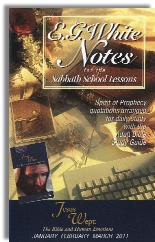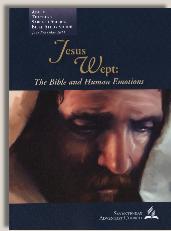|
||||||||||||||
Commentary on "Stress""
Day 3: Monday, January 10, 2011 - Bitter Life Events
Overview
Monday’s lesson deals with the effects of bitter life events and uses Elijah’s experiences killing the priests of Baal after the Mt. Carmel event followed by Jezebel’s threat to kill him and his subsequent flight into the wilderness. Despairing, Elijah asked God to take his life. The lesson ends with a quote from the Desire of Ages in which Ellen White comments about Satan taking advantage of our weaknesses when we are “encompassed with clouds”.
Observations
The lesson leaves out the context of the story of Elijah’s flight to the wilderness and God’s sovereign interception when He calls Elijah back from his fall from faith.
The lesson focuses on Satan’s attempts to derail us during hard times and admonishes the reader to “cling to the memories of how God has worked in your life in the past.”
The Teacher’s Edition comments that God met Elijah on the mountain, renewed his faith, and then explains that “it took the quiet surroundings of the wilderness and a time apart, communing with God with no other distractions, for Elijah to hear the Spirit’s quiet voice reminding him of this important lesson. “It then say that, in times of stress, we need to keep our priorities straight and spend time communing with God.
This lesson emphasizes that we have tools to combat discouragement, that we’re not to forget to take quiet time, get away from the noise of our lives, and commune with God. On the surface this advice sounds solid, but it’s all based in personal discipline.
We cannot combat discouragement with personal or spiritual disciplines. We can only find healing from depression and discouragement in surrender to our Father, holding not to our memories of His work, but to His literal, actual words of promise in Scripture.
To be sure, remembering God’s work in our lives is encouraging and brings perspective, but when we are deeply discourage, such memories do not combat the present overwhelm. Memories of God’s help in the past, for example, are not sufficient to comfort us when we lose a spouse or a child, our own health, or our house or income. Only trust in the God who promises to give us all we need can carry us through dark times.
Only when we are willing to surrender to Him our loss and fear and suffering and receive His will and His promise for provision can be begin to recover.
In Elijah’s case, He lay down under a broom tree and slept in utter depression after asking God to kill him. God didn’t wait for him to think logically; Elijah belonged to God; he was God’s man, chose by God for God’s work. God took charge, and He sent an angel with a fresh-baked cake and a jug of water. After Elijah ate and slept again, the angel returned with more food and said to him, “Arise and eat, for the journey is too great for you.”
God did not tell Elijah to take this journey into the wilderness. Elijah fled in fear, cowed by the evil Jezebel, and he acted without faith. He reacted in fear. Nevertheless, God did not punish him or shame him. Instead, He sent him provisions, reminding him that this journey on which he set out was too great for him—and he sent him food that would sustain him for 40 days of desert wandering.
Elijah’s 40 days of desert wandering is an echo of Israel’s 40 years of desert wandering, and it also echoes Moses’ forty days on Mt Sinai. Elijah’s journey, in fact, ended on Mt. Horeb, another name for Mt. Sinai. Elijah and Moses both met God at the same mountain. Moses experienced God in fire and smoke and loud trumpet sounds; Elijah experienced God not in the fire, not in the earthquake, but in the still, small voice. Moses, who represented the law, and Elijah, who represented Israel’s prophets, each encountered God in unique revelations. The law-representative experienced the symbols of God’s wrath and power; the prophet representative experienced Him in the quietness of personal accountability.
After God provided Elijah nourishment for a 40-day desert journey, He rebuked him at Mt. Horeb for his unbelief and lack of faith. He told Elijah that he was not the only one faithful to God, but there were 7,000 men who had not bowed to Baal whom God had preserved for Himself. He told Elijah to go back and face his work; he sent him back as His messenger and commissioned him to meet and prepare Elisha for his work of succession.
The point of Elijah’s depression is not stress. In fact, stress is a smoke screen for a deeper and more serious problem: lack of faith. Elijah’s depression was natural; God didn’t condemn him for it. But God did strengthen Elijah and then rebuke Him. God first strengthened Elijah miraculously, reminding him that he couldn’t run from God, that God Himself was preserving him. And then God reminded him that God’s work was Elijah’s work, and Elijah had to trust Him and go do what God told him to do.
Conclusion
- Elijah’s despondence was not about “stress”. It was about spiritual exhaustion and giving in to lack of faith.
- God Himself pulled Elijah back to trust Him; He provided food twice and sustained him on a 40-day journey.
- Elijah’s journey to Mt. Horeb echoed Israel’s 40 years of wandering and Moses’ 40 days on the same mountain with God.
- Elijah and Moses, the two on the Mt of Transfiguration with Jesus (see Matthew 12) had experiences with God on the same mountain; Moses saw God in the symbols of His wrath; Elijah experienced God in the intimate quietness of personal accountability.
- Stress is not the issue when we face hard times. The issue is trust.
- The only relief available to us from the debilitating circumstances of life is surrender of our dreams and desires and opening ourselves to know what is true and real. Reality is bigger than we can see.
Copyright 2011 BibleStudiesForAdventists.com. All rights reserved. Revised January 7, 2011. This website is published by Life Assurance Ministries, Glendale, Arizona, USA, the publisher of Proclamation! Magazine. Contact email: BibleStudiesForAdventists@gmail.com.
The Sabbath School Bible Study Guide and the corresponding E.G. White Notes are published by Pacific Press Publishing Association, which is owned and operated by the Seventh-day Adventist church. The current quarter's editions are pictured above.
Official Adventist Resources
Standard Edition Study Guide Week 3
Teacher's Edition Study Guide Week 3


